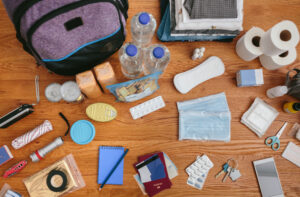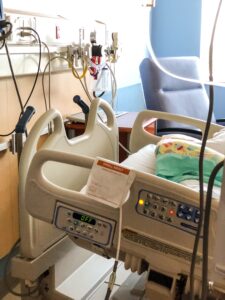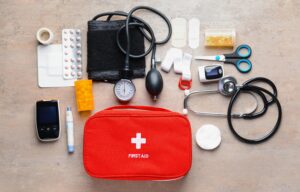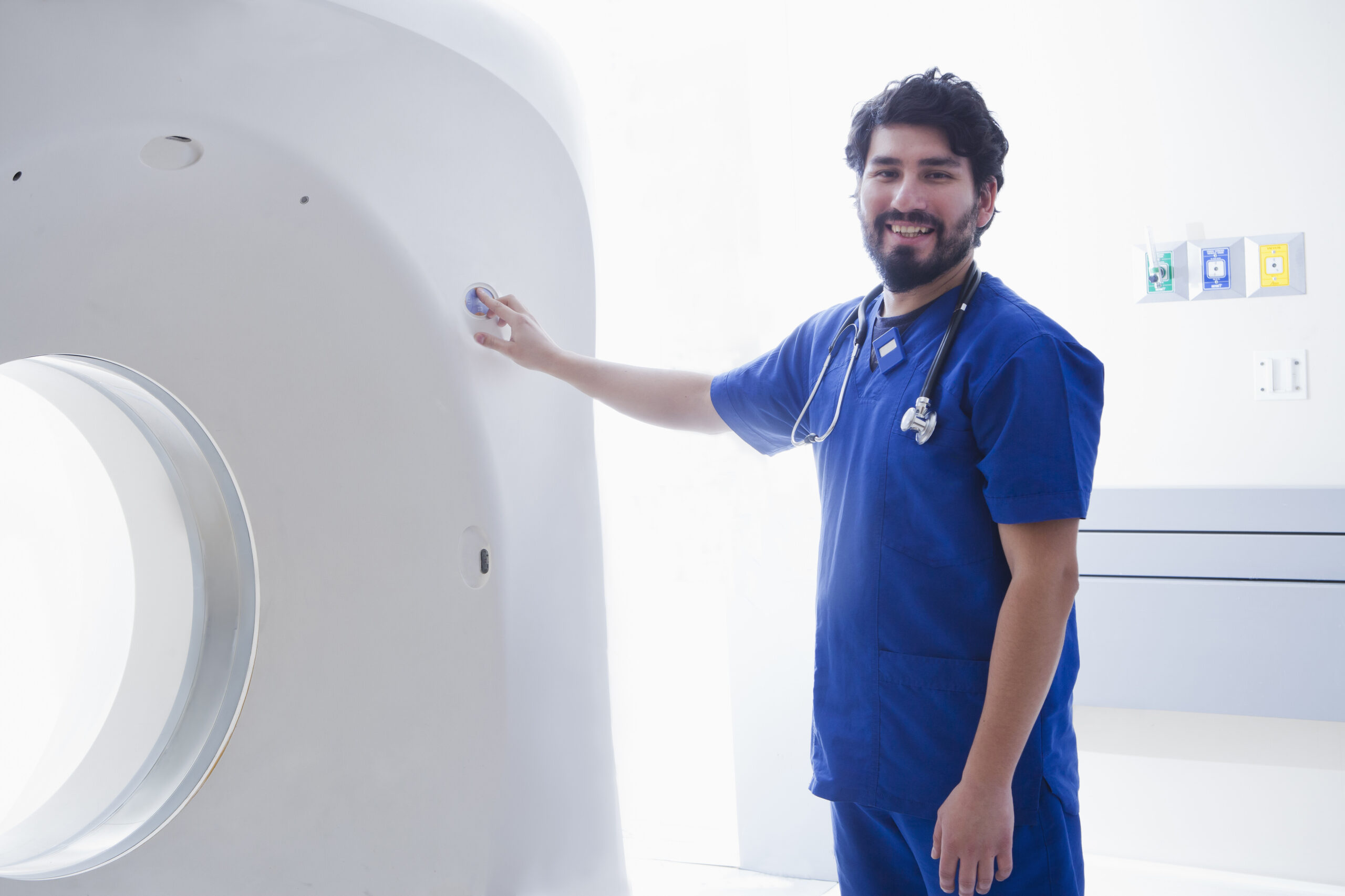Taking Your RV and Camper On Your Traveling Nurse Assignment?
What’s the best way to feel comfortable, add more fun to your assignments, and possibly save cash? Travel nursing with an RV. If you have one of these recreational vehicles, you can bring them along on your assignments.
Why? Because an RV is basically a home on wheels, allowing you to reach any location with ease while making you feel comfortable wherever you are. Some nurses consider this a much better experience than getting temporary accommodation every time you’re reassigned.
So how do you travel as a nurse with an RV? This article will explore all you need to know, from preparing yoru RV to creating a budget. Keep reading!
Benefits of Taking Your RV and Camper
As previously mentioned, owning an RV or camper can take your comfort level while travel nursing from 0-100 very quickly. This is because of the following benefits:
- Flexibility and Mobility: The biggest benefit of owning an RV as a travel nurse is how mobile you can be on assignments. Basically, no matter where you’re posted to, you can always drive from the parking lot to the hospital. It’s a cab and a home in one!
- Familiarity and Comfort: You can take the home factor of an RV and triple it by adding elements that increase your comfort. These could be adding certian posters, fragrances, pictures, and other elements that feel familiar. If done right, this can help you feel at ease in all assignments.
- Reduced Spending: Full-timing in an RV can often be less expensive than renting an apartment or staying in a hotel. You do not need to pay for rent, utilities, and other expenses. Additionally, there are many inexpensive campgrounds and RV parks available.
- Fun and Discovery: When you aren’t working as a nurse, your RV allows you to visit national parks, beautiful roads, and new cities. It’s a convenient way to experience the adventurous side of travel nursing and capture amazing moments.
However, to experience the benefits of owning an RV as a travel nurse, you need to ensure some factors are in order. Keep reading as we detail them below.
How To Be a Travel Nurse with Your RV or Camper
Now that you understand the advantages you can enjoy by going on assignments with your RV, here’s how to actually do it.
1. Preparing for the Journey
When beginning the adventure of travel nursing with an RV, it is crucial to find assignments in RV-friendly locations. Search for towns that have a lot of healthcare facilities, as well as numerous RV parks and campgrounds. Research what amenities these parks have available to make sure they will serve your needs. Also, ensure your documents for the RV, such as your driver’s license, vehicle registration, insurance, and travel permissions, are current.
2. Packing and Organizing Your RV
As one who travels for work, packing and organizing an RV is an art that focuses on space saving while enhancing comfort. Remember that you are going to need medical supplies and equipment to get your work done, so start with those. Also, don’t leave behind personal items that are going to make the RV feel like home. Use collapsible storage containers, multipurpose furniture, and similar space-saving devices. Always ensure that the living and working area remains clean, organized, and clutter-free, making life on the RV more efficient.
3. Navigating Challenges on the Road
With travel nursing in an RV, one of the most important skills is overcoming challenges on the road. For example, your work schedule must be well coordinated with the routes you take to work. For that, you’ll need a GPS or experience with the area. The limited space and resources available can also be hard to deal with, but they can be managed effectively with some planning. At the same time, the RV also needs to be in road-worthy condition, which requires regular maintenance and safety checks. Always stay prepared for surprises and have a calculated plan to deal with breakdowns and poor weather conditions. Reducing these challenges makes travel nursing with an RV even more enjoyable.
4. Staying Connected and Engaged
Having reliable internet and communication solutions is also critical for travel nurses. This is for entertainment, socializing, and for your safety in case you need to call for help.
In this case, mobile hotspots, satellite internet, and Wi-Fi extenders can guarantee good reception for work and also staying in touch with family. Also, consider joining a community of travel nurses, RV clubs, and online forums—it helps ward off loneliness. Above all, during all the traveling, seek to maintain your health and wellness through exercise, self-care, and healthy meals. You can take a walk, do jumping jacks, use a skipping rope, or attend a local gym to stay physically fit.
5. Budget and Manage your Resources
As a travel nurse residing in an RV, you need to take budgeting and financial management very seriously. To do this, we recommend starting with a budget that covers every possible expense, including your fuel, RV maintenance, and parking space. For your fuel cost, you’ll need to analyze how well your RV conserves fuel plus the mileage covered on a full tank. This should help you be more accurate. As for maintenance, try taking it to the mechanic on regular intervals, or if you are tech savvy, you can perform the maintenance yourself.
This routine check ensures that you spot small issues quickly before they escalate into heavy expenses. Lastly, look for parking spaces with cheaper rates, especially those that offer a monthly payment option, which will be perfect for most month-long nursing assignments.
While you’ve prepared your expenses for fuel, maintenance, and parking space, it’s also smart to prepare for unexpected emergencies. These can pop up anytime, and not being prepared can significantly affect your comfort and punctuality during assignments.
Conclusion
Using an RV during your nursing assignments is one way to add more fun, freedom, and comfort to your travel nursing career. The fact that you can decorate it with things that add a personal touch means you’re always at home no matter the location. However, to make the RV lifestyle blend well with travel nursing, you have to be very proactive. This means creating a budget, organizing your RV, understanding the routes, and being social for your mental health. Follow these tips and you’re guaranteed to have a pleasant experience as a travel nurse with an RV.
Check out these other great Staffdna articles

How to Make the Most of Your Free Time as a Travel Nurse
One of the best things about being a travel nurse is the ability to explore diverse healthcare settings while saving lives. However, you need to find time in your busy schedule to do meaningful things. This is where your free time comes in. While limited, it can be the best way to recharge yourself, personally grow, and enjoy the new location at your travel nursing assignment. So, how do you make the most of your free time as a travel nurse? This article will provide all the tips you need to maximize those precious moments of freedom and enjoy your journey as a travel nurse. It will be divided into three sections: how to enjoy your time, grow professionally, and achieve a work-life balance. Keep reading! Why You Need to Make the Most of Your Free Time in Travel Nursing While your job as a travel nurse can be extremely rewarding, it is also demanding, including long hours, irregular shifts, and quick thinking. Failing to find time to recharge yourself can cause your body to be overwhelmed physically and mentally, thereby ruining your performance at work. In other words, your free time is meant to help you strike a work-life balance where you can unwind from being a superhero all day and week and become the regular you. Take the time to do normal activities at your own pace and replenish your mind and soul. Strategies to Maximize Free Time Effectively Basically, free time is precious for a travel nurse as it’s perfect for recharging, exploring, and growing. By properly planning your free time, you can make the most out of it and enjoy your assignment as a travel nurse. Here are some strategies to maximize your free time: 1. Prioritizing Self-Care As a travel nurse, the most productive use of your free time is to take care of yourself physically and mentally. It is critical to your health and well-being that you rest, exercise, and eat properly, especially with emotionally and physically demanding assignments. In terms of mental health, you can also ‘exercise’ by journaling, guided meditation or even stretching, which is less strenuous than going to the local gym. Mainly, make it a point to do things that bring you happiness. This could mean playing a favorite video game, taking a walk, or immersing themselves in a good novel. Whatever you choose, remember to enjoy your free time by taking care of your body and mind. 2. Exploring the Local Area Once you have sorted your personal health, the following step is to explore the local area to create some unforgettable memories during your travel nursing job. Appreciate the local landmarks, enjoy the famous dishes, and deepen your understanding of the local customs. Social media networks display many places of interest, and so do Google Maps and TripAdvisor, so you can use such apps to find prominent places. Also attend local events or local festivals during your free time. All these activities will not only broaden your scope of understanding but create memories to share with your relatives and friends for a lifetime. Basically, after taking care of patients, make it a point to “touch grass.” 3. Building Connections Relaxation is not only about eating well and taking invigorating walks; it also concerns the people you associate with. This social aspect is important because you will be away from family and friends, as well as meeting new people, which can ease the feeling of emptiness you may have during your assignment. Make an effort to relate with your coworkers, other traveling nurses, or even the locals as these will make your stay more happy and social. You can try to meet other health workers by attending hospital functions, enrolling in local clubs, and participating in regional meet-up events. In addition to fighting loneliness, interacting with other people who share similar values and interests equips you with useful contacts for your career endeavors. You get what is essentially a network to support your personal well-being and professionally advance your career. Work On Personal Growth and Professional Development Making the most of your free time goes beyond relaxation; you need to use this period to invest in personal and professional growth. Use this time to explore new hobbies, learn new skills, or discover new ways to move your nursing career forward. Here are some tips to maximize your time for personal and professional growth as a travel nurse: 1. Learning New Skills Your free item as a travel nurse can be the best for expanding your horizon through learning. You can pick a new hobby or skill that either adds joy or variety to your life, while, at the same time, making you more well-rounded. Some common interests people take include learning a new language, photography, and cooking. You can get this information on top online learning platforms like YouTube, Coursera, or Udemy, along with thousands of other topics. It’s worth emphasizing that this new information learnt doesn’t have to be recreational. You can get skills like digital marketing or public speaking to improve your career or open new doors to more lucrative opportunities. 2. Advancing Career Opportunities Still on the topic of advancing your career and preparing for new opportunities, you can use downtimes to pursue additional nursing certifications. These include Advanced Cardiac Life Support (ACLS) or Pediatric Advanced Life Support (PALS), which will add value to your resume. You can get these certifications through online learning platforms like NursingCE or Kaplan, which are ideal for continued education while on traveling assignments. In the meantime, you can discover job or mentorship opportunities by actively networking through Linkedin or nursing organizations. Regardless, your property should be to spend part of your free time advancing your career and reinforcing your passion. Doing this makes every assignment rewarding financially, personally, and professionally. Bonus: Maintaining a Healthy Work-Life Balance While all these tips are excellent strategies, failing to strike a work-life balance will make them almost impossible to apply to your personal

How to Transition from Travel Nursing to a Permanent Role
Travel nursing is one way to combine your love for adventure with your passion for saving lives. However, there comes a time when you may want to shift from that nomadic lifestyle to a more permanent one. You may be doing this for job security, health reasons, settling down with family, etc. Regardless of your reason, you need the right steps to slowly transition from your travel nursing lifestyle to a more stable one. Fortunately, this article will walk you through the processes needed to make a smooth career change from travel nursing into a full-time nursing position. Keep reading! Understand Your Reason for Transitioning The first step to shifting from travel nursing to a more permanent role is to understand why you want to make the change in the first place. Such a decision has a massive impact on your personal and professional life moving forward, so you’ll need to consider several factors before transitioning. Defining Your Goals Your train of reasoning should begin with identifying long-term career and personal aspirations, which you can figure out by asking yourself these questions: Do I value the stability of a single workplace over the excitement of ever-changing assignments? Is building strong relationships with a consistent team or community important to me? How do I see my career growth and job satisfaction over the next five to ten years? Your answer to these questions will help you evaluate whether transitioning to a permanent role is the right step in your career. Financial Planning and Comparison Your primary reason for working as a nurse is the financial compensation, which you will need to consider when making this career leap. Depending on the travel nursing agency and assignment, travel nurses often earn higher pay than permanent nurses, but on the other hand, permanent nurses have other benefits. These benefits include: Health insurance. Retirement plans. Paid time off. Tuition reimbursement for professional development. Compare these benefits and others with your current earnings as a travel nurse and determine if switching is the perfect financial decision. Lifestyle Considerations Changing your role will also affect your life, and in this case, it’s your task to decide if the effect is positive or negative. Your new role can change how close you are to friends and family, provide the opportunity to build a sense of community, and reduce travel demands for work. Your conclusion on these factors will help you decide if transitioning to a permanent nursing role is a better option or whether you need to wait for another opportunity. Tips For Transitioning from Travel Nursing to Permanent Employment Without further ado, let’s look at some expert recommendations for landing a full-time nursing job after being a travel nurse. 1. Researching Opportunities in Permanent Roles Your nursing career change begins with identifying stable job opportunities that match your career goals and current skills. This is necessary before even creating a resume or resigning from your agency, as you need to be sure there are job openings that match your ambition, preferences, etc. Look into different types of healthcare facilities that hire permanent nurses, such as hospitals, clinics, or even specialized facilities (rehabilitation centers, geriatric care). While you research these job openings, note their requirements, such as certification and experience level, to be better prepared when applying. You can find these roles on job boards, social media (LinkedIn), recruitment agencies, and similar options. Most importantly, ensure that the organization has a positive reputation before you apply for a job. You can deduce this by investigating the workplace culture, employee satisfaction, and growth opportunities. Lastly, be certain that the roles available offer opportunities to advance your career, such as leadership roles and specialized training programs. This gives you the confidence that you aren’t working a dead-end job with no opportunity to become a healthcare worker in the future. 2. Preparing for the Transition Once you have confirmed that jobs that match your skills and ambition are available, the next phase is to prepare for the transition. The first phase is your resume and cover letter, which must be structured to highlight the versatility and experience you’ve gained as a travel nurse. Showcase soft skills like adaptability, cultural competence, and the ability to work seamlessly in any healthcare environment. For permanent nursing hard skills, include essential ones like ACLS (Advanced Cardiovascular Life Support), then special certifications such as pediatric nursing or oncology nursing, depending on your role. Also, show your achievements, such as times you’ve directly helped improve patient outcomes or successfully navigated a high-pressure situation. You can also reach out to your supervisors and colleagues from previous travel assignments to provide glowing recommendations. These references show employers that you are reliable, clinically skilled, and can thrive in any health care environment, boosting your chances of landing that permanent role. 3. Navigating the Transition Process Transitioning to a permanent nursing role involves more than securing the job; you need to be ready to adjust to a new professional and personal rhythm. To understand your new role, go through and understand your employment contract. This will detail all employment elements, such as your salary, benefits, work hours, job responsibilities, and more. When reading this document, ensure the salary reflects your experience and skills, and check for benefits like health insurance, retirement plans, and paid time off to ensure they meet your needs. It’s also important to keep an open mind during this career change, as you won’t have the same flexibility you once enjoyed as a travel nurse. However, you’ll have the chance to build deeper connections and a sense of community with people at your workplace. Expect to face hurdles along the way, as adapting to long-term commitments and a fixed routine can feel difficult at first. You can find support amongst your colleagues, stay focused on the positives like stability and career growth, and be proactive about addressing concerns with your new employer. 4. Focusing on Long-term Career Growth in Permanent Roles As previously mentioned, the goal of

The Ultimate Travel Nurse Survival Kit: Essentials for Every Assignment
The Ultimate Travel Nurse Jobs Survival Kit: Essentials for Every Assignment If you are considering travel nursing jobs as an exciting opportunity, you must know everything about it. Finding travel nurse jobs is not about just placements and adventure. You have to understand the full course of it, and that includes packing your survival kit. However, packing your very first travel nurse survival kit might make you a little nervous and overwhelmed about what to pack. But worry not, we have got you! Most travel jobs are short-term, typically 13 weeks long. However, they can range from 8 to 26 weeks, depending on your contract. Hence, packing for your travel nursing job means packing essentials that you may be using for a few months. This is why you may need to pack a few more things than you may pack for your weekend road trips. However, don’t overpack; after all, this is temporary, and soon you’ll be heading to a new location for your next travel nursing job. Travel jobs give you much freedom and flexibility. However, this experience depends on how well you’re prepared by packing the right essentials. This becomes even more crucial for aspiring travel nurses who are just exploring how to become a travel nurse. But if you are well-prepared with your survival kit, this can be exciting and stress-free. So, let’s help you pack your survival kit for your next travel nursing job! 10 Must-Haves for Travel Nurse Jobs Before you jump straight to packing for your travel nurse job, you need to consider a few things. This is because unplanned packing will lead to being unprepared for your job. Planning ahead will help you realize what you actually need and what you can skip. The very first thing you need to do is communicate with your travel nursing agency to find out what they will provide. For instance, many travel nurse jobs come with their own housing, probably near the facility. However, some travel jobs offer stipends instead. So, you need to figure out what things will be available based on your residential arrangements. Check if your living space has basic appliances or not. It will really reduce your load on moving everything. The next thing is some research. Explore the location online to find out what kind of weather you’ll get and what type of location it is. This will help you figure out what type of gear you need. Do you need winter apparel or sundresses? And finally, you need to consider how you are traveling. If it’s a nearby location, you can go by car and fit everything you need in the trunk or backseat. You can come back later if you need anything. However, if it’s across the state, you may need to take a flight, train, or bus. Then you can only take a few things with you and ship the rest to your location. Most travel nurse jobs reimburse travel expenses. However, make sure to ask your staffing agency, as perks may vary for travel jobs. Once you figure out what you need to pack and what you can leave, packing will be much easier. Here are some must-haves for your travel nurse job: 1. Wearables Clothes, nurse shoes, scrubs, pajamas, and intimates are really important. However, don’t pack your entire wardrobe; you are only going for a few weeks. So, only take what you need, such as a few casual outfits, scrubs that comply with the facility’s dress code, loungewear, shoes, etc. If you are pregnant, consider packing maternity scrubs. Nurses are at high risk of developing foot conditions like plantar fasciitis, heel spurs, fallen arches, etc., due to prolonged standing. Hence, pack good quality nurse shoes with compression socks to prevent such discomfort. Some items, such as a jacket, sweater, swimsuit, rain gear, sun hat, etc, depend on your location. 2. Personal Care Items The next most important thing is your personal care items. You definitely want to take your skincare, makeup, and hygiene products. However, don’t go overboard and pack a ton because you can get these things when you reach your location. Also, if you have chosen fully furnished housing, chances are you’ll get all these things. Hence, just keep a few days’ supply of essentials only just in case, and stock up later. 3. Electronics Electronics are important for travel nurse jobs. Hence, make sure to pack your laptop, e-reader, tablet, and, of course, phone. You’ll need them for studying for additional certification and communication. Also, don’t forget the chargers for each. 4. Paperwork and Financial Info Paperwork and financial info are necessary when you are traveling for months. Hence, make sure to bring copies and originals of important documents for work, commuting, and emergencies. Some essential ones are: Travel nurse job contract Driver’s license Car registration papers Insurance card Birth certificate Social Security card Nursing license and certifications Passport (in case of cross-country detour) Credit and debit cards 5. Medications & Prescriptions In case you are on prescription meds, pack yourself a full supply and prescriptions for refills. Make sure to pack a small first aid kit, a couple of day’s supply of vitamins, and any over-the-counter medicines you use. However, don’t take too much; again, you can get them from any pharmacy. If you get your prescription from a certain place, you can use a local post office to pick up your medications when you travel. 6. Cooking and Kitchen Appliances Most furnished housing would already have basic kitchen appliances. However, if you use any certain ones, be sure to take them with you, such as your coffee maker, tea kettle, or slow cooker. Your residence most probably has a toaster, microwave, and pots and pans, so you don’t have to worry about that. However, just in case, speak with your travel staffing agency or landlord about what things they will provide or not. If they are not provided, you can get utensils when you reach there. But if you

A Day in the Life of a Travel Nurse: From Sunrise to Sign-Off
A Day in the Life of a Travel Nurse: From Sunrise to Sign-Off Nursing jobs are very demanding and rigorous. Hence, many nurses opt for a travel nurse job for better work-life balance and flexible schedules. If you are an RN who has worked with travel nurses, you must be tempted by their adventurous tales. However, if you want to make sure that travel nursing jobs are for you, you must be curious to know what a day looks like for a travel nurse before you pack your bags to hit the road. We are here to help you decide if travel nursing jobs are the right move for you or not. Typically, travel nurses are hired on a need basis to bridge the staffing gap in healthcare facilities. These travel jobs are available all across the US and offer short-term assignments, typically ranging from 8 to 26 weeks. For travel jobs, you need to be very adaptable and flexible to work in various medical settings. Travel nurses are picked for their extensive skills and experience. Hence, they get various benefits and perks. If you are interested in this career path, let’s unravel a day in the life of a travel nurse! What Does a Typical Day Look Like for a Travel Nurse Job? Nursing jobs are nothing close to typical. Each day is a new challenge, a new goal, and something new to learn. Much of the responsibilities of a travel nurse is similar to permanent nurses, such as taking care of patients, conducting physical exams, communicating with patients, families, healthcare teams, coordinating with doctors, monitoring vitals, administering medications, etc. However, they also have to stay updated on the latest medical advancements, medications, and treatment plans. Most of the travel nurse jobs are available in acute care units, where urgent care is needed. Travel nurses can take various shifts, including day, evening, night, midday to midevening, or 3 p.m. until 3 a.m. However, it also depends on the facility’s requirements and contract. Similarly to permanent RN jobs, most travel nursing job shifts are 12 hours. However, some specialties may have 8 to 10-hour shifts as well. Every medical facility has its own work routines. However, every travel nurse job has some standards, such as orientation. If you are working with a travel nursing staffing agency, they might provide onboarding assistance, including any necessary training to seamlessly transition into this new role. Arriving at the Location Taking a new travel job means a new city, new location, new climate, new colleagues, and everything new. Hence, you may consider arriving early at your location to settle first. Give yourself a couple of days before starting your job for some time adjusting to a new place. This way, you get plenty of time to understand the new schedules and cater to any challenges you have faced during the move. Another benefit of arriving early is that it gives you some time to explore your new neighborhood, look for shops, and get familiar with your new place. Jet lag can also be a challenge if the travel job is in a different time zone. Gearing Up for the Shift of Travel Nurse Job Travel nurses typically start their day early, especially on the first day. This is because starting a new job at a new location, among new people, can be intimidating. Hence, getting a slight headstart can be good to adjust before starting work. Getting ready for a travel nurse job typically involves the following steps: Gear up with comfortable nurse shoes and compression socks to prevent foot fatigue. Also, if you are an expecting woman, consider a maternity scrub to stay comfortable throughout your shift. Take necessary things. Usually, travel nurses need to bring their own stethoscopes and scrubs that comply with the medical facility’s dress code. All the other supplies are provided by the hospital. Have an adequate breakfast with a proper meal and hydration to maintain energy throughout the demanding shift. Commute to the assigned healthcare facility, either by car or public transport. You may need to report early on your first day for handover and instructions. Check in on your assigned unit and begin your work by reviewing patient records, monitoring vitals, and completing all the tasks assigned to you by your supervisor. What Happens When the Day Begins at a Travel Nurse Job? Once the initial orientation and reviewing period is over, travel nurses dive straight into hands-on patient care. The day begins by getting patient reports from the nurse in the previous shift. Afterwards, the responsibilities are all the same as any other nurse job. Monitor vitals, conduct physical exams, administer medication, assist medical teams, document patient records, etc. Do Travel Nurses Take Breaks? Of course, like any other allied travel career or hospitalist job, travel nurses take breaks during their shifts. Maintaining a balanced diet is essential, especially when you are on the move. Hence, travel nurses must take meal breaks even if they have a very busy shift. Hydration is also important, and consequently bathroom breaks. The stigma about nurses is very strong that they can handle everything. However, nurses are just like you and me and definitely need to step away from work to relax and replenish themselves. Many facilities let travel nurses go outside for some fresh air. However, they are always on call as emergencies can happen at any given moment. How Does a Travel Nurse End Their Shift? When the shift nears its end, travel nurses transfer patient care to the nurse in the next shift. Hence, they wrap up their day with final patient roundups for proper details, check the electronic health record (EHR) entries, and finally hand over the reports to the next nurse. Usually, a travel nurse job does not have overtime. However, it may be involved, which depends on your contract. Hence, make sure to go through your contract thoroughly before signing. Although you may feel obligated to provide care to patients as a healthcare

The Biggest Challenges in NICU Nursing & How to Overcome Them
Neonatal Intensive Care Unit is a dedicated and specialized field that works mainly for newborns who are critically ill, including premature infants and the ones who are in severe medical conditions. NICU staff provide life-saving interventions, non-stop monitoring, and compassionate care to some of the most crucial patients in healthcare. Their role and responsibilities are more than their actual role, as they are readily available to offer emotional support to the parents who are severely anxious about the uncertain challenges being faced by the newborn’s health. The impact of NICU nurses in healthcare is quite noticeable. They collaborate with neonatologists, therapists, and other specialists to create personalized care plans that improve fragile infants’ survival chances. Their expertise in advanced medical technologies, such as ventilators, ensures that premature babies get the support they need. The NICU is incredibly in demand as the most rewarding domain of the nursing industry. The emotional and physical toll of healthcare workers in a highly stressful environment requires resilience, skill, and compassion. However, the ability to make vast changes in the lives of newborns and their families makes NICU a promising and irreplaceable profession in the industry, along with the best therapy jobs you can hunt on right now while staying in this domain. Photo by Pexels Managing Premature Births The core part of NICU nurses ‘ jobs is genuinely caring for the premature babies who are born before 37 weeks of gestation. Most of these babies are likely to suffer from underdeveloped organs, making it much more difficult to feed, breathe, and function properly. NICU must see all the vital signs to provide specialized care and work closely with neonatologists to ensure these infants are adequately attended to. How to Overcome This Challenge NICU nurses can enhance their flexibility to care for such premature infants by staying updated on the latest neonatal guidelines and practices. Attending various workshops and courses can help them improve their skills; further, collaborating with a proper team ensures that the best possible care strategies are being used for every infant. Ensuring Respiratory Distress The majority of the newborns in the NICU experience respiratory issues due to having immature lungs or congenital conditions. RDS, Respiratory Distress Syndrome, BPD, and Bronchopulmonary Dysplasia must be catered to carefully, ensuring sufficient oxygen therapy and surfactant administration. How to Overcome This Challenge To overcome this challenge effectively, NICU nurses must master ventilator management and oxygen therapy. Being familiar with different types of ventilators and non-invasive methods, such as CPAP, is crucial. Being trained regularly on respiratory management can help nurses to provide an optimal care solution while minimizing the risk of complications. Adapting To The Evolving Medical Technologies There is no doubt that NICU nursing needs a strong command and proficiency in handling medical technologies, which include incubators, ventilators, and infusion pumps. Strong advancements in neonatal care technology make it essential for a flow learning curve and adaptability. How to Overcome This Challenge To stay current with such medical advancements, NICU nurses should participate in various hospital programs and online courses related to neonatal care. Also, interacting in the training sessions helps ensure you become more confident and comfortable using medical equipment. Providing Developmentally Supportive Care Premature and critically ill babies in the NICU need appropriate care to support their growth and reduce stress, which could be any sort of care. Excessive noise, too bright lights, and too frequent medical interruptions can be too much for these patients. Being developmentally supportive is an essential aspect of this job, so it is also crucial to keep this aspect in mind. How to Overcome This Challenge NICU can strategize various methods, including clustering different care-intensive activities to reduce disturbances, effectively using dim lights, and even providing gentle handling techniques like Kangaroo care (skin-to-skin contact). Also, educating parents about such methods and encouraging their active involvement in the protection process can play a pivotal role in achieving better results. Balancing Emotional Strain Taking care of critically ill newborns can be emotionally overwhelming for the nurses. Seeing the challenges faced by those little ones, along with experiencing loss in some cases, can lead to emotional breakdown, exhaustion, and burnout. Make sure to train your mind to be strong enough to tackle any challenges you face while performing your duty, since in most cases, you need to think and act accordingly to what your mind says rather than being dependent on an emotional response. How to Overcome This Challenge NICU nurses must put themselves in self-care and seek emotional support and connection when needed. Hospitals and clinics must give them mental health resources, which include therapy and counselling sessions, to help nurses cope with the emotional demands of their jobs. Being engaged with such practices, regular exercises, and taking breaks can also help diversify your stress management. Enhancing Family-Centered Care Parents of the NICU infants are likely to go under severe pressure and stress due to the sensitive health of their child. Being thorough and communicating effectively while involving family is essential, ensuring they are heard and listened to in the NICU care. How to Overcome This Challenge NICU nurses can make family-oriented care by simply keeping the parents informed and updated about their child’s health, encouraging them to be more in contact skin-to-skin, involving them in active participation, and the decision-making process. Furthermore, hospitals can implement family-oriented programs to ensure parents feel empowered and engaged in their child’s healthcare journey. Coping with Staffing Challenges One of the factors that goes unnoticed is the staffing shortages, which can increase and overburden the existing workload for nurses already assigned various duties. High patient-to-nurse numbers can significantly impact the quality of care and overall nurses’ well-being. How to Overcome This Challenge Hospitals must address adequate staffing to ensure optimal range for patient care, and NICU nurses can support one another via teamwork and delegating tasks. Further, mentorship courses can help new nurses transition easily into the working environment, which puts a full stop to stress management on the team. Wrap Up

Essential Tech Gear for Healthcare Travelers: What to Pack for the Road
Essential Tech Gear for Healthcare Travelers: What to Pack for the Road Healthcare professionals who travel and commute long distances, including those who travel in x-ray tech jobs, ultrasound tech jobs, physical therapy jobs, hospitalist jobs, and remote physician assistant jobs, always face obstacles and challenges while on the go. A more reliable solution is needed to tackle such issues. Ensuring a smooth and seamless operation between hospitals and clinics while staying connected. Packing the right tech gear can significantly change your daily workflow and overall well-being. In this blog, we will explore the best essential gear for healthcare travelers to ensure they are well-equipped for their next task. Photo by Pixabay Understanding the Need for Tech Gear The life of an average healthcare employee mostly lives out while commuting to work, to the patients’ homes, or running back and forth to the hospitals. One can truly rely on this profession, which is highly respected than any other. For that, technology takes further control in improving efficiency, accuracy, and communication for healthcare professionals, and applications such as StaffDNA are at the leading position. Workers often deal with unpredictable schedules and the need for access to real-time patient data. From medical devices to reliable internet connectivity, buying the right essentials can empower healthcare travelers to deliver state-of-the-art care, regardless of where they are. Stay Connected Anytime, Anywhere: Portable Wi-Fi Hotspots Having a well-working internet connection is a crucial factor for most healthcare travelers, no matter what domain you work for. Let it be a reviewing for patient records want to send the diagnostic reulsts, connectivity remains uninterrupted. Hospitals and clinics provide internet access, but due to the heavy workload and various devices and computers connected, it might be unsecured, slow, or inaccessible. This is where the portable Wi-Fi hotspot shines—ensuring that the healthcare professionals stay in touch with the staff and patients. One of the best-suited options to look forward to is the Simo Solis Lite. This compact and lightweight device provides high-speed internet without needing a local SIM card, making it ideal for professionals who move to different locations frequently. Charging Stations To Keep You Powered Up Emergency medicine jobs are no less stressful, and managing multiple electronic devices is a daily drill. So, keeping everything charged can be challenging if it’s a smartphone for communication, smartwatch for health tracking, or wireless earbuds for being connected during long working hours. A multi-device doc station reduces the hassle of carrying multiple chargers and unhinged wires by offering a streamlined solution to power up all your gadgets. Efficiency and organization are the main keys for traveling healthcare workers; a 3-in-1 doc station offers that. Reducing the hassle of carrying multiple wires, cables, and adapters with a single device ensures that everything stays ready to go. Personal Comfort And Health Workers who travel for nursing Jobs usually face long working hours, commuting daily, and challenges of adjusting to the different working environments. Let it be taking a short nap for a few hours in a noisy hospital room or trying to sleep on a heavily crowded flight. Personal comfort plays a vital role in maintaining overall well-being and job performance. To make your every investment worthwhile, opt for the noise-canceling headphones, none other than Bowers & Wilkins Px7 S2e Over-Ear Headphones, which provide exceptional sound and are equipped with active noise-cancellation features to let the workers focus, relax, or take important calls without any distractions. Maximizing Sleep For Better Productivity A complete sleep cycle is another critical factor in the healthcare industry. Traveling nurses are way too exhausted to do more than 12 hours of a shift; for that, they need sleep, which allows them to get a solid rest. The Trtl Travel Pillow offers the best solution with its neck support, making your travel much easier during flights, bus rides, or if you are on a short recess. Its minimal and compact design makes it a perfect and an essential travel partner. Paired with an AI-driven app that recognizes your sleeping and rest patterns for optimal cycles, this is one of the must-have gadgets for every healthcare traveler looking to catch a rest on the go or improve the overall quality of their sleep. Monitor Your Health Personal health is as crucial as caring for the patients, and one should not simply overlook it. Working in long shifts, irregular schedules, and consistent travel can take an effect on your physical as well as mental well-being. AI-powered smart monitoring devices are helpful; they enable professionals to maintain a strong focus on their fitness while managing a demanding lifestyle. To cater to that, the Fitbit Flex Activity Wristband is a great gadget, as it comes packed with various features such as tracking steps, burned calories, heart rate, and sleeping cycles. AI-driven results can be a game-changer that gives you curated results. Giving you an optimal solution for work-life balance. Portable Medical Devices For nursing jobs, portable medical devices are as vital to them as for the patient, helping to manage chronic conditions while you commute to work or the patient’s home. For that, the Mayluck Portable Nebulizer is a sleek and compact device for those dealing with asthma or respiratory issues. Being too light makes it easy to carry anywhere with you. With the best portable solution, it ensures an optimal delivery. Having such gear while you commute can be life-saving, allowing healthcare workers to focus more on their work without worrying about their health. Packing Cubes Packing cubes are becoming more common and an essential part of the travel accessory, helping healthcare workers to maximize their suitcase space while keeping their other clothing and needs all arranged. If you are a traveling therapist, ultrasound technician, or someone who has just started their career in nursing, being well-organized can make transitioning between multiple assignments much smoother. Among the top choices of consumers, the Calpak Packing Cubes Set stands out as a pinnacle for its sturdy build, lightweight design, and variety of sizes. Such







